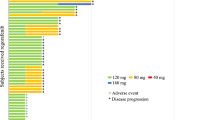Abstract
Background
Regorafenib has been approved among the treatment options for patients with advanced stage colorectal cancer (CRC), hepatocellular carcinoma (HCC), and gastrointestinal stromal tumors (GIST). In this study, we aim to report the real-life experience of the safety and tolerability regorafenib in our institution.
Methods
We conducted a retrospective chart review of 43 patients who received regorafenib in Kuwait Cancer Control Center (KCCC) from 2016 to the end of 2019. Data collected include diagnosis, patient demographics, performance status, number of previous lines of treatment, number of treatment cycles, side effects, best-tolerated dose, and treatment discontinuation due to intolerability. Univariate analysis with Pearson chi-square test were conducted to study co-relation between discontinuation rates and several factors.
Results
We had available data for 43 patients (23 males and 20 females). Of the patients, 83.7% had an ECOG performance status of 0 or 1. Seventy-three percent were diagnosed with metastatic CRC, 21% were diagnosed with HCC and 6% were diagnosed with GIST tumors. Half of the patients received 3 lines or more of treatment prior to regorafenib. The median number of cycles received was 3.7 with 11.6% of patients still on active treatment at the time of analysis. The most reported grade 3 and above side effects included rash (41.9%), fatigue (39.6 %), hypertension (25.6%), mucositis (21.9%), hand-foot syndrome (2.3%), and hyperbilirubinemia (4.6%). The best-tolerated dose was 80 mg and that was achieved in 44.2% of patients. The recommended dose of 160 mg could only be achieved in 20.9% of patients. The treatment was discontinued because of intolerability in 25.6% of patients. The discontinuation rates in those with ages 60 years and above versus below 60 years were 91% and 68%, respectively.
Conclusion
In our cohort, the best-tolerated dose of regorafenib was 80 mg. Toxicity and intolerability of regorafenib lead to treatment discontinuation in nearly a quarter of patients. Patient age may influence tolerance and adherence to regorafenib.
Similar content being viewed by others

References
Wang DH, Park JY. Precision medicine in gastrointestinal pathology. Arch Pathol Lab Med. 2016;140(5):449–60.
Wilhelm SM, Dumas J, Adnane L, Lynch M, Carter CA, Schütz G, et al. Regorafenib (BAY 73–4506): a new oral multikinase inhibitor of angiogenic, stromal and oncogenic receptor tyrosine kinases with potent preclinical antitumor activity. Int J Cancer. 2011;129:245–55.
Van Cutsem E, Sobrero AF, Siena S, Falcone A, Ychou M, Humblet Y, Bouche O, Mineur L, Barone C, Adenis A, Tabernero J. Phase III CORRECT trial of regorafenib in metastatic colorectal cancer (mCRC).
Grothey A, Van Cutsem E, Sobrero A, Siena S, Falcone A, Ychou M, et al. Regorafenib monotherapy for previously treated metastatic colorectal cancer (CORRECT): an international, multicentre, randomized, placebo-controlled, phase 3 trial. Lancet (London, England). 2013;381:303–12.
Li J, Qin S, Yau T, Ma B, Pan H, Xu J, et al. CONCUR: a randomized, double-blind, placebo-controlled phase 3 study of regorafenib monotherapy in Asian patients with previously treated metastatic colorectal cancer (mCRC). Ann Oncol. 2014;25:ii114.
Chan SL, Ma BB. An update on the safety and efficacy of regorafenib in the treatment of solid cancers. Expert Opin Drug Metab Toxicol. 2014;10(11):1607–14.
Ducreux M, Petersen LN, Öhler L, Bergamo F, Metges JP, de Groot JW, et al. Safety and effectiveness of regorafenib in patients with metastatic colorectal cancer in routine clinical practice in the prospective, observational CORRELATE study. Eur J Cancer. 2019;123:146–54.
Demetri GD, Reichardt P, Kang YK, Blay JY, Joensuu H, Maki RG, Rutkowski P, Hohenberger P, Gelderblom H, Leahy MG, von Mehren M. Randomized phase III trial of regorafenib in patients (pts) with metastatic and/or unresectable gastrointestinal stromal tumor (GIST) progressing despite prior treatment with at least imatinib (IM) and sunitinib (SU): GRID trial.
Finn RS, Merle P, Granito A, Huang YH, Bodoky G, Pracht M, Yokosuka O, Rosmorduc O, Gerolami R, Caparello C, Cabrera R. Outcomes with sorafenib (SOR) followed by regorafenib (REG) or placebo (PBO) for hepatocellular carcinoma (HCC): results of the international, randomized phase 3 RESORCE trial.
Bruix J, Merle P, Granito A, Huang YH, Bodoky G, Yokosuka O, Rosmorduc O, Breder VV, Gerolami R, Masi G, Ross PJ. Hand-foot skin reaction (HFSR) and overall survival (OS) in the phase 3 RESORCE trial of regorafenib for treatment of hepatocellular carcinoma (HCC) progressing on sorafenib.
Rutkowski P, Stępniak J. The safety of regorafenib for the treatment of gastrointestinal stromal tumors. Expert Opin Drug Saf. 2016;15(1):105–16.
Lam KO, Lee KC, Chiu J, Lee VH, Leung R, Choy TS, et al. The real-world use of regorafenib for metastatic colorectal cancer: a multicentre analysis of treatment pattern and outcomes in Hong Kong. Postgrad Med J. 2017;93(1101):395–400.
Bekaii-Saab TS, Fang-Shu O, Anderson DM, Ahn DH, Boland PMK, Ciombor KK, et al. Regorafenib dose optimization study (ReDOS): randomized phase II trial to evaluate dosing strategies for regorafenib in refractory metastatic colorectal cancer (mCRC). J Clin Oncol. 2018;36(4_suppl):611–1.
Gotfrit md J, Vickers md M, Sud md S, Asmis md T, Cripps md C, Goel md R, et al. md,D. Jonker md, and R. Goodwin. Real-life treatment of metastatic colorectal cancer with regorafenib: a single-center review. Curr Oncol. 2017;24(4):234–9.
Calcagno F, Lenoble S, Lakkis Z, Nguyen T, Limat S, Borg C, et al. Efficacy, safety, and cost of regorafenib in patients with metastatic colorectal cancer in French clinical practice. Clin Med Insights: Oncol. 2016;10:59–66.
Del Prete S, Cennamo G, Leo L, Montella L, Vincenzi B, Biglietto M, et al. Adherence and safety of regorafenib for patients with metastatic colorectal cancer: observational real-life study. Future Oncol. 2017;13(5):415–4232.
Author information
Authors and Affiliations
Corresponding author
Ethics declarations
Conflict of Interest
The authors declare that they have no conflict of interest.
Additional information
Legal entity responsible for the study: The authors.
Publisher’s Note
Springer Nature remains neutral with regard to jurisdictional claims in published maps and institutional affiliations.
Rights and permissions
About this article
Cite this article
Elseud, Y.A., Shaaban, A., Mohanty, A. et al. Safety and tolerability of regorafenib: a real-life experience. J Gastrointest Canc 53, 187–191 (2022). https://doi.org/10.1007/s12029-020-00570-1
Accepted:
Published:
Issue Date:
DOI: https://doi.org/10.1007/s12029-020-00570-1



